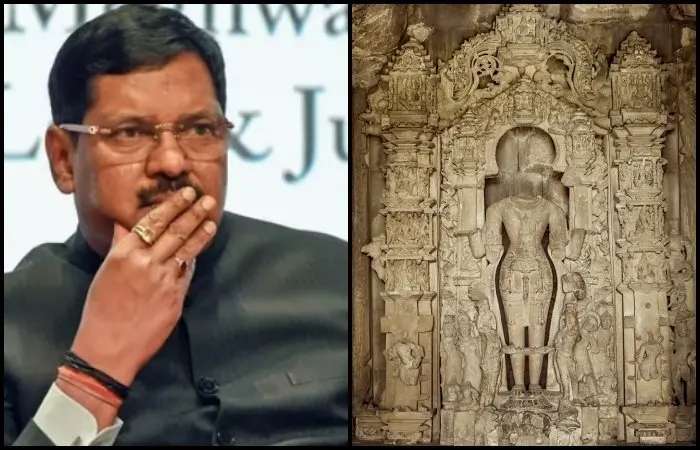
1. Explosive Outrage: VHP Slams CJI Gavai’s ‘Mockery’ of Hindu Faith Over Khajuraho Remarks (photo-X)
The Case That Stirred the Nation: What Happened in Court
When VHP Calls Out CJI Gavai for Insensitive Remarks on Hindu Worship – On September 16, 2025, the Supreme Court of India heard a petition seeking the restoration of a seven-foot idol of Lord Vishnu at the historic Javari Temple in Khajuraho, Madhya Pradesh. The idol, reportedly damaged during Mughal invasions centuries ago, remains in a broken state despite repeated appeals to the Archaeological Survey of India (ASI) and state authorities.
The petitioner argued that the idol’s restoration was not just a matter of archaeology, it was about faith and the fundamental right to worship. He claimed that the continued neglect violated Article 25 of the Constitution, which guarantees freedom of religion.
But what truly sparked controversy was the oral remark made by Chief Justice of India B.R. Gavai during the hearing. In response to the petitioner’s passionate plea, the CJI said:
“Go and ask the deity himself to do something. You say you are a staunch devotee of Lord Vishnu, so now pray to Him.”
The bench also dismissed the plea as a “publicity interest litigation,” stating that the matter fell under the jurisdiction of the ASI not the Court.
VHP’s Strong Reaction: Faith, Dignity, and Responsibility
The Vishva Hindu Parishad (VHP), a prominent Hindu organization, reacted sharply to the CJI’s remarks. In a public statement, VHP President Alok Kumar said the comments “mocked the beliefs of Hinduism” and urged all parties including judges to exercise restraint in speech, especially within the courtroom.
The VHP emphasized that:
- The court is a temple of justice, and Indian society places deep trust in its integrity.
- Remarks that appear dismissive of religious beliefs can erode public faith in the judiciary.
- All courtroom participants litigants, lawyers, and judges have a duty to uphold dignity and respect.
The organization also posted its statement on social media, where it quickly gained traction among religious groups, legal experts, and concerned citizens.
Public Sentiment
Social media platforms lit up with reactions ranging from outrage to calls for judicial accountability. Some users even demanded an apology or clarification from the Chief Justice, while others defended the judiciary’s right to dismiss frivolous petitions.
CJI Gavai Responds: Clarification and Context
Amid growing backlash, CJI Gavai issued a clarification, stating that his comments were misrepresented on social media and taken out of context. He emphasized:
“I respect all religions.”
The CJI explained that his remarks were made in the context of the temple being under the ASI’s jurisdiction. He reiterated that the Court could not intervene in matters that fall under archaeological governance.
The Solicitor General of India also defended the CJI, saying:
“I know the CJI for the last 10 years. My lord visits temples and places of all religions with reverence.”
This clarification helped calm some of the outrage, but the incident still sparked a broader debate about how faith, law, and public discourse intersect in modern India.
Lessons for Civic Dialogue: Faith, Law, and Respect
This controversy offers more than just headlines, it provides a moment for reflection on how India navigates its pluralistic identity and constitutional values.
Faith vs. Law
- The judiciary must balance legal boundaries with cultural sensitivity.
- Citizens have the right to worship, but courts must operate within jurisdictional limits.
- When faith-based petitions are dismissed, the reasoning must be clear and respectful.
Role of Public Figures
- Judges, like elected officials, carry symbolic weight in society.
- Their words can influence public trust, especially in emotionally charged cases.
- Exercising restraint and empathy is not weakness, it’s leadership.
Social Media Amplification
- In today’s digital age, every remark can go viral, often stripped of context.
- This incident shows how quickly public sentiment can escalate, and why clarity matters.
- It also highlights the need for media literacy and responsible reporting.
Civic Unity
- India’s strength lies in its diverse beliefs and shared values.
- Disagreements must be handled with dialogue, not division.
- Respecting each other’s faiths and institutions – is key to a healthy democracy.
Final Thoughts: A Moment to Rebuild Trust
The Khajuraho idol case may seem like a small legal matter, but it touched a deep nerve in Indian society. It reminded us that faith is not just personal, it’s public, emotional, and constitutional.
As citizens, we must hold our institutions accountable, but also give them space to clarify and correct. As judges, lawyers, and leaders, the responsibility to speak with care and act with integrity has never been greater.
This is not just about one idol or one remark, it’s about how we build a society where faith and justice walk together.
Stay informed with the latest news and updates – only on Rapido Updates.